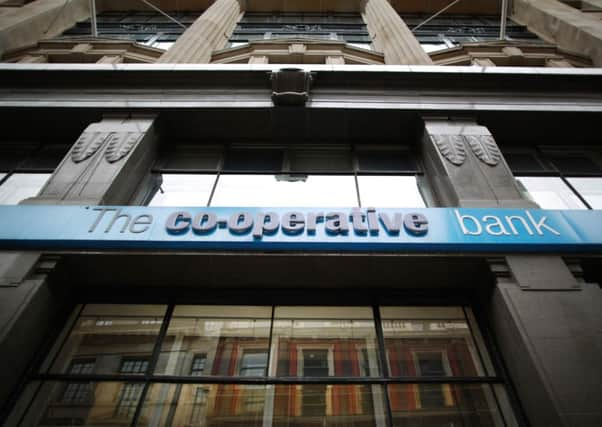Labour set to end Co-op Bank relationship


Senior party sources have admitted that Labour is considering moving its loan with the Co-op Bank, which has supported the party since the 1920s when a deal was struck with the Co-operative movement, and instead borrowing from the Unity Trust Bank.
However, the move has been portrayed by the Tories as Labour leader Ed Miliband putting his party even further into the control of the trade unions which own 75 per cent of the Unity Trust Bank.
Advertisement
Hide AdAdvertisement
Hide AdTory chairman Grant Shapps said: “These proposals would hand the trade unions even more control over Ed Miliband and the Labour Party.
“The unions already pick the candidates, buy the policies and choose the leader. Now Ed Miliband wants them to hold the purse strings as well.
“If Ed Miliband is too weak to stand up to the trade union barons then he is too weak to stand up for hardworking people. This would put Britain’s economic security at risk.”
However, Labour insiders insisted that the move was aimed at consolidating the party’s debt which has been reduced from £25 million in 2006 to £4.5 million today. This includes paying back the £10 million of unsecured loans from rich party backers in the so called cash for honours scandal which rocked Tony Blair’s premiership.
“We constantly review our financial arrangements and any decisions taken, including any consolidation of loans, are done for commercial reasons,” a Labour party spokesman said.
Labour also reportedly no longer has a £3.9 million overdraft facility with the Co-op Bank which it had up until last year.
But the decision to end the relationship with the Co-op Bank, which had been a byword for ethical banking, was being widely interpreted as a vote of no confidence in the the institution which has come close to collapse in recent months.
The Co-op Bank hit trouble last year when a £1.5 billion pound capital shortfall was exposed after a disastrous takeover of the Britannia Building Society, leading the mutually-owned Co-operative Group to lose control of the business to bondholders including US hedge funds who reportedly want to make it “apolitical”.
Advertisement
Hide AdAdvertisement
Hide AdEarlier this week, it emerged that a report into the near collapse of the Co-operative Bank will blame poor governance at the organisation.
The bank’s problems were exacerbated when former chairman Rev Paul Flowers, a Methodist minister, gave an embarrassing error strewn performance before the Treasury Select Committee and then later was charged with possessing illegal drugs.
The future of the bank remains in question after it said in March it needed to raise another £400 million to cover the cost of past misconduct.
It was unclear how the move will affect Labour’s relationship with the Co-operative Movement which provides the party with a large number of MPs including shadow Chancellor Ed Balls and is a major donor.
In 2012 the Co-operative Group gave more than £800,000 to Labour. Of this, £563,000 went directly to The Co-operative party, a wing of the Labour party with 32 MPs. Another £242,000 went to its councils while Mr Balls received £50,000 for his office.
Jon Cruddas, the Labour policy review chairman, has insisted the party wants to retain its ties to the Co-operative Group, but admitted damage had been inflicted by the bank’s poor commercial decisions.
He said: “The greatness of the Co-op bank was the trust of its members and, through the Co-operative Group, their shared governance of their own money. That is what needs to be rebuilt in the economy and in politics: devolving power so that it lies with people who belong to associations for their mutual benefit. We need more power to people in our politics and in society and we need the Co-operative Group and Co-operative party to lead the way.”